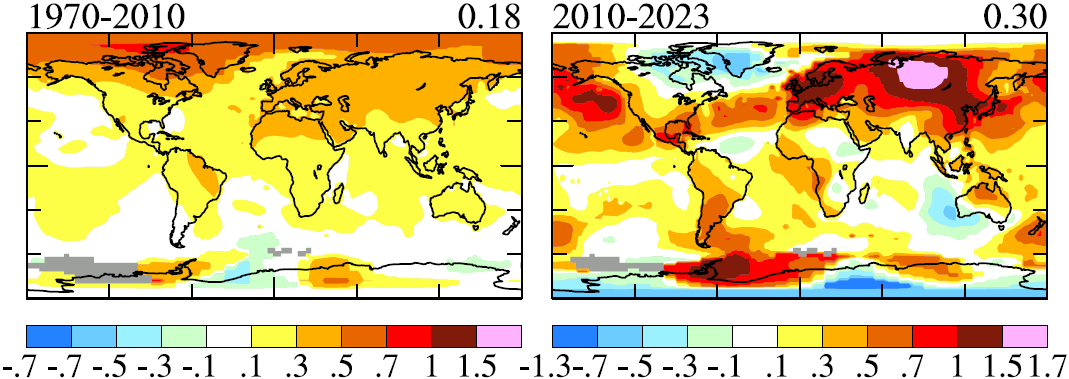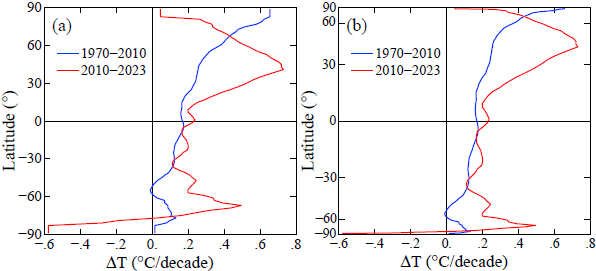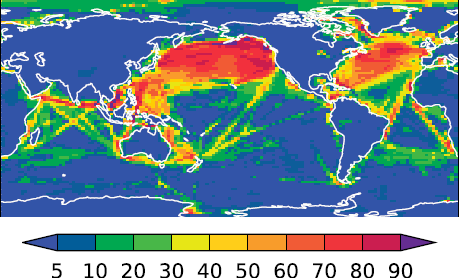Welcome to DU!
The truly grassroots left-of-center political community where regular people, not algorithms, drive the discussions and set the standards.
Join the community:
Create a free account
Support DU (and get rid of ads!):
Become a Star Member
Latest Breaking News
General Discussion
The DU Lounge
All Forums
Issue Forums
Culture Forums
Alliance Forums
Region Forums
Support Forums
Help & Search
Environment & Energy
Related: About this forumJames Hansen, Makiko Sato, Pushker Kharecha -- Global Warming Acceleration: Hope vs Hopium
http://www.columbia.edu/~jeh1/mailings/2024/Hopium.MarchEmail.2024.03.29.pdf
Fig. 1. Local and global (the number in upper right corner) temperature trends in two periods.
Global Warming Acceleration: Hope vs Hopium
29 March 2024
James Hansen, Makiko Sato, Pushker Kharecha
Accumulating evidence supports the interpretation in our Pipeline paper: decreasing human-made aerosols increased Earth’s energy imbalance and accelerated global warming in the past decade. Climate sensitivity and aerosol forcing, physically independent quantities, were tied together by United Nations IPCC climate assessments that rely excessively on global climate models (GCMs) and fail to measure climate forcing by aerosols. IPCC’s best estimates for climate sensitivity and aerosol forcing both understate reality. Preservation of global shorelines and global climate patterns – the world humanity is adapted to – likely will require at least partly reversing global warming. Required actions and time scale are undefined. A bright future for today’s young people is still possible, but its attainment is hampered by precatory (wishful thinking) policies that do not realistically account for global energy needs and aspirations of nations with emerging economies. An alternative is needed to the GCM-dominated perspective on climate science. We will bear a heavy burden if we stand silent or meek as the world continues on its present course.
Our paper, Global Warming in the Pipeline, ¹ was greeted by a few scientists, among the most active in communication with the public, with denial. Our friend Michael Mann, e.g., with a large public following, refused to concede that global warming is accelerating. We mention Mike because we know that he won’t take this notation personally.
Accelerated global warming is the first significant change of global warming rate since 1970. It is important because it confirms the futility of “net zero” hopium that serves as present energy policy and because we are running short of time to avoid passing the point of no return. We will focus on advancing our research now and completing Sophie’s Planet in 2024, so we must limit our interactions this year. We will send out updates every other month for the remainder of this year, as described in a recent note. ² This is the March update.

Fig. 2. Zonal-mean temperature trends, plotted linear in latitude (a) and area-weighted (b).

Fig. 3. Percent of sulfate from ships prior to IMO regulations on fuel sulfur (Jin et al.³ )
Global warming in 2010-2023 is 0.30°C/decade, 67% faster than 0.18°C/decade in 1970-2010 (Fig. 1). The recent warming is different, peaking at 30-60°N (Fig. 2); for clarity we show the zonal-mean temperature trend both linear in latitude and area-weighted. Such an acceleration of warming does not simply “happen” – it implies an increased climate forcing (imposed change of Earth’s energy balance). Greenhouse gas (GHG) forcing growth has been steady. Solar irradiance has zero trend on decadal time scales. Forcing by volcanic eruptions has been negligible for 30 years, including water vapor from the Honga Tunga eruption. ⁴ The one potentially significant change of climate forcing is change of human-made aerosols. The large warming over the North Pacific and North Atlantic (Fig. 1) coincides with regions where ship emissions dominate sulfate aerosol production (Fig. 3, from Jin et al.³ ).
…
¹ Hansen J, Sato M, Simons L et al. Global warming in the pipeline. Oxford Open Clim Chan 3(1), doi.org/10.1093/oxfclm/kgad008, 2023
² Hansen, J, Kharecha P, Sato, M. Global warming acceleration, research and publication priorities, 14 Feb 2024
³ Jin Q, Grandey BS, Rothenberg D et al. Impacts on cloud radiative effects induced by coexisting aerosols converted from international shipping and maritime DMS emissions. Atmos Chem Phys 18, 16793-808, 2018
⁴ Schoeberl, MR, Wang Y, Ueyama R et al. Analysis and impact of the Hunga Tonga-Hunga Ha’apai stratospheric water vapor plume. Geophys Res Lett 49, e2022GL100248, 2022
…
InfoView thread info, including edit history
TrashPut this thread in your Trash Can (My DU » Trash Can)
BookmarkAdd this thread to your Bookmarks (My DU » Bookmarks)
0 replies, 434 views
ShareGet links to this post and/or share on social media
AlertAlert this post for a rule violation
PowersThere are no powers you can use on this post
EditCannot edit other people's posts
ReplyReply to this post
EditCannot edit other people's posts
Rec (6)
ReplyReply to this post